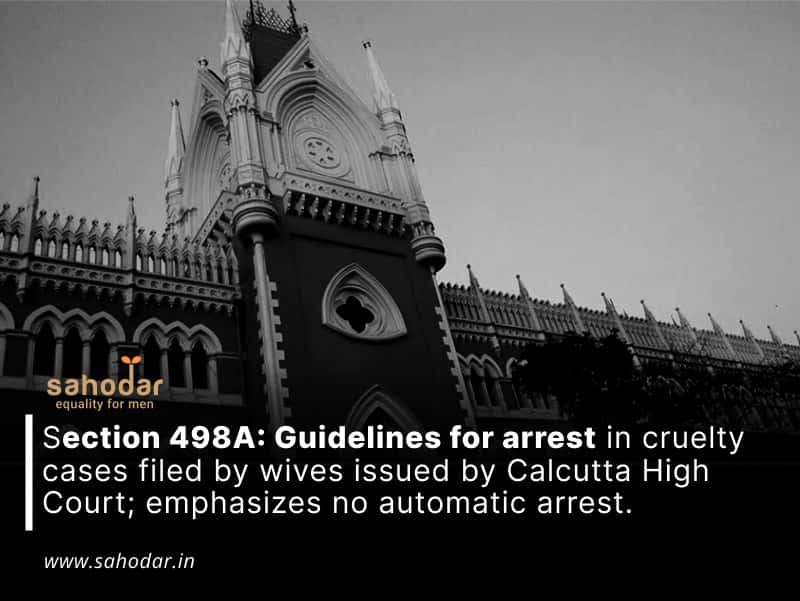As per the notification issued on August 23, the High Court has ordered the State police to ensure that an individual is not ‘automatically’ arrested merely on the registration of a case under Section 498A.
In the previous week, the Calcutta High Court released a circular outlining directives to be followed by both the State police and criminal courts when apprehending an individual, particularly in instances involving cruelty towards a wife under Section 498A of the Indian Penal Code (IPC) or the Dowry Act.
As indicated by the notification from the Calcutta High Court on August 23rd, the State police have been instructed to guarantee that an individual is not subjected to immediate arrest solely based on the filing of a case under Section 498A.
“All the State Governments to instruct its police officers not to automatically arrest when a case under Section 498-A is registered but to satisfy themselves about the necessity for arrest under the parameters flowing from Section 41 Criminal Procedure Code (CrPC),” the notification said.
The notification was released subsequent to a directive from the Supreme Court on July 31st, mandating that the instructions outlined in a previous ruling known as the Arnesh Kumar case should be transformed into notifications and guidelines. These are to be adhered to by sessions courts and other criminal courts.
The Supreme Court had taken cognizance of the widespread misuse of the provisions laid out in Section 498A.
Within its verdict, the highest court had also instructed the Directors General of Police in all States to ensure rigorous adherence to these guidelines.
The notification from the High Court, issued in accordance with the same, stipulates that all police officers must be equipped with a checklist encompassing specified sub-clauses under Section 41(1)(b)(ii). This checklist delineates the procedure to be followed for the arrest of an individual.
“The police officer shall forward the check list duly filled and furnish the reasons and materials which necessitated the arrest, while forwarding/producing the accused before the Magistrate for further detention,” the notifications reads.
Upon reviewing the report presented by the police officer, the Magistrate will authorize the detention of the accused only when they are content with the provided information.
“The decision not to arrest an accused, be forwarded to the Magistrate within two weeks from the date of the institution of the case with a copy to the Magistrate which may be extended by the Superintendent of Police of the district for the reasons to be recorded in writing,” the guidelines state.
The accused must be served with a notice of appearance according to the provisions of Section 41A CrPC within a period of two weeks from the commencement of the case. This duration can be prolonged by the District Superintendent of Police, provided they provide written justification for the extension.
“Any failure to comply with these directions shall apart from rendering the police officers concerned liable for departmental action, they shall also be liable to be punished for contempt of court to be instituted before the High Court having territorial jurisdiction,” the notification has made it clear.
Equivalent measures are suggested for Magistrates who permit detention without documenting the rationale behind it.
The High Court clarified that these directives will be applicable not only to cases falling under Section 498A or Section 4 of the Dowry Prohibition Act, but also to instances where the offense is punishable by a term of imprisonment ranging from less than seven years to a maximum of seven years, with or without a fine.
Source : https://www.barandbench.com/news/section-498a-calcutta-high-court-guidelines-arrest-cruelty-cases-lodged-wife-no-automatic-arrest

